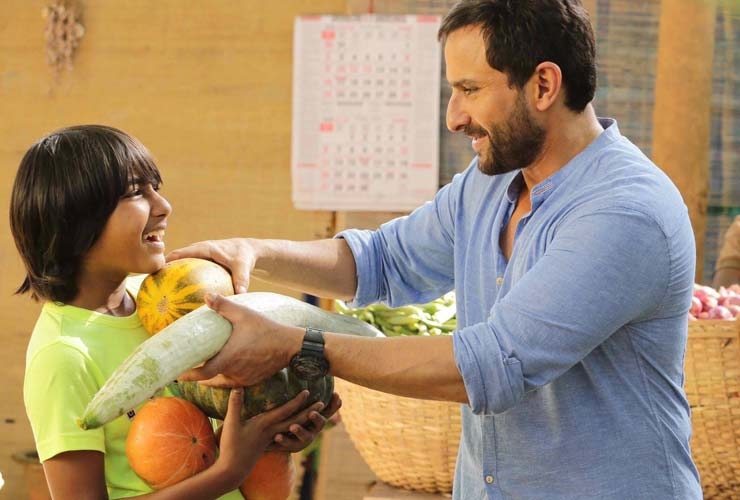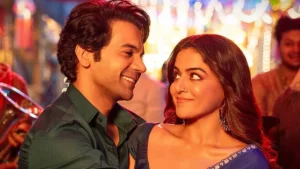
As Bollywood made its vital transition from the awful 90s, we saw Saif Ali Khan emerging as the poster boy of suavity. Metrosexuality became acceptable and a few heroes like Khan could comfortably shed their put-on desiness. Be it a cartoonist (Hum Tum) or a chef (Salaam Namaste), the majority of his on-screen characters sported an air of richness, privilege and passion. Eventually, we saw new lads on the block taking to the Saif Ali Khan sub-genre with equal flair and also with an added burst of youthful energy. Not a thing to find fault at, Khan himself evolved and tried to age gracefully on screen with a wider set of films – although the successful ones (Cocktail, Love Aaj Kal) remain in the very old seams.
Cut to 2017 and Saif Ali Khan is back in the chef’s garb yet again. The official remake of the eponymous Hollywood film, Chef’s Saif Ali Khan is no longer a Tom Cruise-look sporting playboy or a spoilt rich heir. Still, he belongs to the unique space he had carved for himself and the generation that followed. Faulted, disturbed and impatient, Saif’s Roshan Kalra is introduced as a famous chef whose food, of late, lacks his trademark ‘personal’ flavour. Narrated in a very straightforward format, director Raja Krishna Menon and co-writers Suresh Nair and Ritesh Shah leave no scope for twists and surprises in the film.
Chef is a food film which, incidentally, finds it appropriate to spoon-feed every detail of the protagonist’s life. However, the technique refuses to make the cut except for the progression in Roshan’s relationship with his son Armaan (Swar Kamble). Be it Roshan’s wife (Padmapriya) or his estranged father, the film makes an attempt to include excessive background details and subsequent closures. What for? There are peripheral players who show up and disappear without adding anything to the platter. Case in point being Vini (Sobhita Dhulipala) who is present just to speak out the audience’s mind at that point of time. As for the food angle in the film, it isn’t captivating enough to make you rush to a plush restaurant soon after the show.
Now let’s get to the atmosphere and the people around. Set in Kerala for most parts of it, Raja Krishna Menon’s version of the state is the one straight out of tourism brochures. Bungalows in Fort Kochi area cushioned like plush resorts, the production design barely sheds the film’s touristy vibe. Even as we know that Roshan is up to building a bond with his son while figuring out a unique business venture by himself, we still look at him as a visitor who is trying out myriad things. The issues rarely seem real and the film’s unlived setting deserves a decent dose of flak here. There’s a lot of Malayalam and native Malayali actors but the usage of English and Hindi seems majorly forced.
A large part of the glitch lies in the fact that Saif Ali Khan appears too disconnected from the surroundings. And this is despite a fairly nuanced performance. The actor’s charming gait and polished accent make it hard for us to perceive him as Roshan Kalra who left home at 15 and made way to a starry chef career in the US. Even as the film takes us to Roshan’s roots in Chandni Chowk and Amritsar, we barely feel the sync. For us, Roshan is far from the son of the soil who would eat and serve the langar in the Golden Temple out of sheer hunger. The actor’s nawab aura is hard to go off unless it happens to be a Vishal Bhardwaj who is wielding the megaphone. You feel the difference when we are introduced to the aristocrat Biju (Milind Soman) who looks anything but Malayali. Somehow his portions work in the film’s favour. The reason here is that the film rightfully avoids over-explaining him or his character’s impact in the larger scheme of things. His bonding with Armaan and even casual statements about his knowledge on Sandro Botichelli explains why he is there in Radha’s life.
Chef also wants to serve a pie on parenting. Brought up with discipline and independence by his danseuse mom, Armaan is wary of using “bad words” but his dad’s Delhiite roots die hard – at least the film wants to believe so. The writing in Chef also demands Roshan to discover active parenting joys. Consequently, it ends up contradicting with the film’s own ideas about man-woman relationships, work-life balance et al. Singularly they make sense while refusing to create a balance within which the characters can thrive. The weakest link is the climax where everything magically falls into place. Be it the father’s change of hearts or the weird turnaround on Roshan’s equation with Radha, Chef falls flat in the finale.
To give credit where it’s due, Chef is not fully devoid of merits either. Padmapriya is a picture of immense grace that Bollywood severely lacks in today. Somewhere we wish the story ran through her as the actor seems more clued to her value systems and her little concerns evoke empathy as opposed to the main protagonist. Cinematographer Priya Seth captures Kerala with utmost dexterity and her frames deem the film’s tiring road trip portions watchable. Chandan Roy Sanyal’s earnest performance as the generic yet memorable do-gooder friend is also noteworthy.
A big downer, however, comes from the editing department. Chef’s transition from one sequence to another look laborious. Especially in the father and son’s trip to the North, the flow is similar to that of an unexciting travelogue show on television. There’s no thread that binds the entire journey together. The same can be said about most portions in the latter half as Raja Krishna Menon chooses to intersperse his narrative with too many songs that add to the film’s overall tedium. Having said that, Chef’s background score and sound design deserve two thumbs up.
The makers seem to have spent enough time in Indianizing the whole concept of Jon Favreau’s version. Some are as basic as throwing a Dil Chahta Hai reference. Then there’s the picture postcard canvas that the film is mounted on. These quirks elicit zilch impact as the central character’s tribulations refuse to click. At one point in the film Roshan echoes, “Kisi Malayali ka pyaar paana isn’t easy,” Personally, I couldn’t agree more!
Rating: ★★ 1/2

